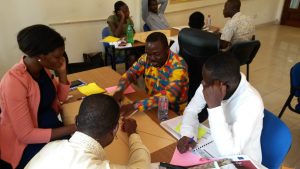No Overthinking—Replicate to multiply impacts of Clean Cookstove Enterprises
The economic, social and environmental benefits of eco-inclusive enterprises in developing countries are well known. Take clean cookstoves for instance: they help reduce respiratory diseases, avoid deforestation and create job opportunities such as designing, selling, and servicing stoves along the value chain.
Yet, Global Alliance for Cookstoves in 2015 estimated about 3 billion people still cook over open fires or use cookstoves of insufficient quality which has hazardous economic, environmental and health consequences.
At SEED, we have been working with a number of successful Clean Cookstove enterprises: Nishant Bioenergy, WANA Solutions, Awamu, 5 Star Stoves and Greenway Grameen Infra, to explore pathways in expanding their reach and impact beyond their locality, region or country.

These enterprises largely require low upfront investment, have simple and adaptable business models, and have proved to be financially viable, thus making them suitable for replication across regions or borders.
Not business as usual
In our Replication Programme, we are spreading the idea of showcasing, copying, and adapting these proven business models in different geographical locations for quicker impact.
How do we do it? SEED conducts research on the performance of various high impact eco-inclusive enterprises to identify the most promising business models and their experiences, challenges and success factors. Learnings from the research are distilled into business model specific replicator workbooks such as Briquettes to Biomass and Local Clean Cookstove Replicator Workbooks.

These workbooks are made available to aspiring entrepreneurs in Replicator Connect workshops in Ghana, Burkina Faso, Kenya, Uganda, South Africa and Mauritius. At those workshops, selected applicants receive hands-on support to take their first steps towards building their own Clean Cookstove enterprises based on their original or adapted business idea. Special focus is given to creating a local ownership and ensuring that the new enterprise is anchored in local context.
The SEED Replicator is built on SEED’s understanding that local ownership and multi-stakeholder partnerships in combination with non-financial tailored business development support are the ingredients for ensuring successful replication of eco-inclusive businesses.
Connecting to start
Over the past couple of months, we have had Replicator Connect Workshops in Uganda, Ghana, Kenya and South Africa, and witnessed great interest from aspiring entrepreneurs in replicating different clean cookstove business models.
Through our Online Matchmaking Platform, originators (established entrepreneurs) have been able to consider different replication models such as franchising, partnerships and joint ventures proposed by different adopters in their replication plans. Some of those plans have been reviewed by originators who are keen on assisting adopters start their own enterprises in their locality.
We are continuing with a second round of Replication Connect workshops, and from workshop to workshop, we are connecting aspiring entrepreneurs to established ones to start their replication journey. These connections are deepening our conviction that one alternative way of multiplying impacts of eco-inclusive businesses is copying and adapting. Yes, copying and adapting different cookstove business models in different geographical areas through various forms of partnership.
Stay tuned! We will introduce more of our Originators and share more insights on our online matchmaking at www.seed.uno soon!
Images shared in the blog are from the Replication workshop in March, 2017 in Accra, Ghana
This blog is a part of the July 2017 series on energy access in partnership with Hystra.
Read the full series for more lessons from practitioners, trends in business models, market penetration and understanding and measuring impact in the energy sector.